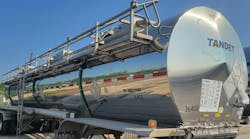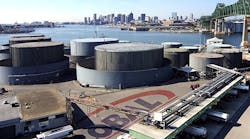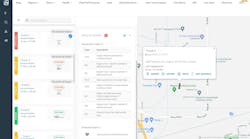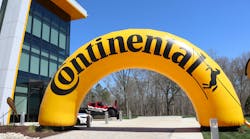BECAUSE of changes on the regulatory front, especially in California, it has become difficult to clean products due to the issue of discharge water.
“It has become very expensive to take care of some effluents to where you have to decide not to do it anymore or put in some very expensive pre-treatment or post-treatments on water,” said Travis O'Banion of National Tank Services/Trimac Transportation.
O'Banion was on a panel, along with Greg Winters of QualaWash Holdings LLC and Gerald Aime of National Tank Services, to discuss, “Restrictions on Chemicals and Effluents: The Ramifications.” The panel discussion took place during the National Tank Truck Carriers' Tank Cleaning & Environmental Council annual seminar June 4-5 in New Orleans, Louisiana.
Aime, wash rack and environmental manager for National Tank Services, said his company has to abide by the National Pollutant Discharge Elimination System (NPDES) permit program, which controls water pollution by regulating point sources that discharge pollutants into waters of the United States.
Point sources are discrete conveyances such as pipes or man-made ditches. Individual homes that are connected to a municipal system, use a septic system, or do not have a surface discharge do not need an NPDES permit, but industrial, municipal, and other facilities must obtain permits if their discharges go directly to surface waters. In most cases, the NPDES permit program is administered by authorized states.
“We want to protect the future for our kids and grandkids,” Aime said. “We have a pretty large treatment facility — a chemical, physical, and biological system that we run — and discharge close to 50,000 gallons a day. In the biological tank are microorganisms that digest waste products. It's a great system, but the chemical-physical is put there to pull out some of the chemicals before they hit the biological system.
“We deal with the Department of Environmental Protection (DEP) annually, sometimes more than once a year. They come to the facility unannounced. You have 30 minutes, then you have to walk them around and give them what they want. We've been very successful. A lot of things are associated with the permit: limitations on what you can discharge. It goes back to the chemical restrictions. We limit it to what we clean at our facility. So we have to obey that. We can't clean herbicides or pesticides. That's chemical restrictions on the permit part. There's best-management practices, daily inspections, filtering systems you have to install to prevent you from going over your limitations.
“You have monitoring equipment that must be inspected daily. Every month, you have to calibrate and have to have it certified. All this must be documented for the DEP. When DEP comes, the first thing they want to see is everything documented — every test you perform every day, every test you perform by a certified lab weekly, monthly, annually, including all inspections you do every day.”
Good stewardship
Winters, vice-president of sales for QualaWash, said good stewardship is critical.
“We're all responsible to agencies and to companies and last but not least, we're responsible to our customers to be able to make sure we are handling both the discharge side of our business and the inside of the business in an appropriate manner,” he said. “The biggest issue from a customer-service standpoint with agencies now is that they are struggling on different levels, not the least of which are budgets. Federal budgets are being cut, and the trickle-down to municipalities is even tougher. They can't raise taxes. What are they going to do? They have to develop some way to keep their businesses running. So they're visiting locations and tank washes with more frequency.
“Technology has certainly made it more feasible to monitor things than they did in the past. Now all of sudden they can come in with a meter to check discharge and come up with data they didn't have before. Added to that, when any given facility in certain areas did not intentionally go exceed discharge limits, they often were allowed to continue operations. More and more, the municipalities are cutting that out. So what do you do? Cap ex is tight on the company side. You can't just arbitrarily go in and redo wastewater handling systems at all locations, whether it's one facility or 55. How do we respond to that? Ultimately, how do we go back to our customers and be able to say, ‘Hey, we were once able to clean that product, but we can't anymore, worst-case scenario, or we have to capture a higher percentage of the water instead of putting it into drain to be legally picked up by a treatment system.’ Then we have to send the water away for treatment, which is costly.
“We have to look at compatibility issues we never had to look at before. It ain't easy, doing what we're doing. But we've got to do it. In addition to road-tank customers, we do a lot of ISO tank container business. We quote, on an average basis, 10-20 products a day to NVOs (non-vessel owners) to be able to say six months from now, ‘We will be able to clean this product, and this is how we will do it.’
“Information on MSDSs (material safety data sheets) is getting more cryptic and less informational, so you've got to guess. The last thing any of us want to do is be able to have an ISO tank in a location six months after we quoted the thing and say, ‘We can't do it because now we see what really came out of that tank. We have a problem with the discharge.’ We have to keep customers informed to the point where they understand what's going on. There are just so many things we can do in the confines of our capability to price it. To make it work and make it work well, somehow we have to communicate that to our customers.”










